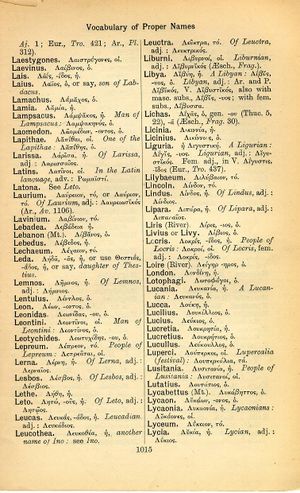Lerna
ἅπανθ' ὁ μακρὸς κἀναρίθμητος χρόνος φύει τ' ἄδηλα καὶ φανέντα κρύπτεται· κοὐκ ἔστ' ἄελπτον οὐδέν, ἀλλ' ἁλίσκεται χὠ δεινὸς ὅρκος χαἰ περισκελεῖς φρένες. → Long, unmeasurable Time brings to light everything unseen and hides what has been apparent. Nothing is beyond hope; even the fearsome oath and the most stubborn will is overcome. | All things long and countless time brings to birth in darkness and covers after they have been revealed! Nothing is beyond expectation; the dread oath and the unflinching purpose can be overcome.
English > Greek (Woodhouse)
Λέρνη, ἡ.
Of Lerna, adj.: Λερναῖος.
Latin > English (Lewis & Short)
Lerna: ae, and Lernē, ēs, f., = Λέρνη,
I a forest and marsh near Argos, through which flowed a stream of the same name; the abode of the Lernæan Hydra, which Hercules slew with the help of Iolāus, and then drained the marsh: belua Lernae, Verg. A. 6, 287: anguifera, Stat. S. 2, 181: fecunda veneno, id. Theb. 9, 340: haec dextra Lernam Placavit, Cic. poët. Tusc. 2, 9, 22: et Lerne pulsa tridente palus, Prop. 2, 26, 48 (3, 22, 20), where Müll. Lernae: Lerne, also a town situated there, acc. to Mel. 2, 3, 9.—Hence,
II Lernaeus, a, um, adj., Lernæan: pestis, Lucr. 5, 26: anguis, Verg. A. 8, 300: hydra, Prop. 2, 19, 9: mixtus Lernaei labe veneni, Ov. M. 9, 130: sagittae, with which Hercules killed the Hydra, Luc. 6, 392: cancer, killed by Hercules at the same time with the Hydra, Col. poët. 10, 313. —
B Poet., transf., Argive, Grecian: Lernaei reges, Stat. Th. 5, 499: alumni, id. ib. 4, 638: coloni, id. ib. 3, 461.
Latin > French (Gaffiot 2016)
Lerna,¹³ æ, f., [poet.] Cic. Tusc. 2, 22 ; Virg. En. 6, 287 ; Lernē, ēs, f., *Prop. 2, 26, 48 ; Mela 2, 51, Lerne [marais de l’Argolide où Hercule tua l’Hydre] || -næus, a, um, de Lerne : Lucr. 5, 26 ; Virg. En. 8, 300 ; Prop. 2, 19, 9 || argien, grec : Stat. Th. 4, 638 ; 5, 499.
Latin > German (Georges)
Lerna, ae, f. u. Lernē, ēs, f. (Λέρνη), ein See, sowie ein ihn durchfließender Fluß u. eine in der Nähe liegende Stadt bei Argos im Peloponnes, wo Herkules die vielköpfige lernäische Schlange u. den ungeheuren Krebs, der der Schlange zu Hilfe kam, tötete, Verg. Aen. 12, 518. Mela 2, 3, 9 (2. § 51). Cic. poët. Tusc. 2, 22; vgl. Hyg. fab. 30: belua Lernae, die lernäische Schlange, Verg. Aen. 6, 287: griech. Akk. Lernān, Stat. Theb. 11, 434. – Dav. Lernaeus, a, um (Λερναιος), a) lernäisch, anguis, Verg., serpens, Amm., hydra, Prop., echidna, Ov.: cancer, Colum. – b) poet. = argivisch, griechisch, Stat.

